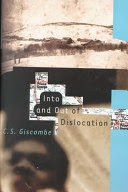Thursday, April 23, 2015
Sunday, April 19, 2015
PARISH 13: Hollow Lane (via Callow Hill) -- Whitehall Farm -- Egham
A hollow way
on the way
back to Egham
the path worn down
into sandy loam
root branch and potsherd
a brand in its way
barely sticking out
curving and the end
shallow land track
Southwest Trains
whistling past toward
Virginia Water
Saturday, April 4, 2015
Five Great Spatial (Projective) Poetry Books
Re-reading parts of Derek Gregory's Geographical Imaginations this weekend for inspiration, I was struck by how much he talks about mapping and metaphor.
For some reason all of this made me start thinking about poetry. Perhaps it was McGill-Queen's University Press's recent announcement reminding me that, in Canada, April is poetry month. My personal library features several titles from MQUP's poetry list. Carmine Starnino, I saw read in Montreal at Drawn and Quarterly. Susan Hancock's Cast From Bells is wonderful (though I managed to leave my copy in a basement in Montreal, not exactly easily reachable from the garden in Surrey in which I'm writing).
Here are five books of poetry that have a great sense of space. Gregory is right to point out that mapping is an overused word and that calling it a metaphor often leaves things in a muddle, less clear (and thus less useful) than they were before. These books, on the other hand, clarify, project, and interpellate in spatial ways that are both beautiful and practical. They map in the best sense of the word, and in this sense they are the best books for starting to think about (metaphors for) mapping.
1. C.S. Giscombe, Giscome Road (Dalkey Archive). This book of projective verse conjures sense of place, names, and Miles Davis and it includes maps, cut up in ways that mimic lines of (projective) verse. I caught a glimpse of Giscome outside London Drugs in Prince George British Columbia after reading his wonderful Into and Out of Dislocation (North Point Press). Both books embody postcolonial hybrid sensibilities as they explore aspects of an ancestor Giscome, immigrant to Canada from Jamaica and one of the first black arctic explorers.
2. Atsuro Riley, Romey's Order (University of Chicago Press). Riley's poetry is stunning, spatial, familial, and unforgettable. When I read Riley I think this is how I want to write. The poetic equivalent of Cormac McCarthy (without so much violence), you get to read a novel's worth of gnarled poetic imagery in just a few condensed pages after which you feel like you've been running around like you did when you were a kid, coming back in, exhausted, exhilarated, and infused with potential energy.
3. A.R. Ammons, Garbage (Norton). This long poem is a ticker-tape of stunning observation, detail, and churning poetic (and spatial) capability. I would go as far as to call it a critical analysis of technology, society, and space. His other work worth noting (because I've read it), is Tape for the Turn of the Year, written on a long stretch of adding machine tape. This one out-does Kerouac by a mile for sheer interest. And for stream-of-consciousness writing (a description which only partly does justice to this masterpiece) that is saying something.
4. As the above choices show, I love American Poetry. It is my favourite kind, a love inculcated by my long running subscription to the Chicago-based Poetry. Michael Donaghy's Collected Poems (Pan MacMillan) doesn't exactly break the mould (he was born in Brooklyn) but was known as a London-based poet. The poems exhibit wonderful senses of space, or at least it seemed to me that way when I read them in my tent at Estes Park in Colorado, a cave of escape from an impending PhD defence that, at the time, was looming.
5. Derek Walcott, White Egrets (Farrar, Strauss, Giroux). This is a fantastic book of poetry from the Nobel Prize-winner whose utterances are utterly captivating. A telling of old age as something specifically so new and liberating it takes the breath away, this is essential reading. How to layer thoughts into compelling, deep, manifestations of thought-enacted, this manual for mapping is essential reading.
Happy (Easter) reading!
4. As the above choices show, I love American Poetry. It is my favourite kind, a love inculcated by my long running subscription to the Chicago-based Poetry. Michael Donaghy's Collected Poems (Pan MacMillan) doesn't exactly break the mould (he was born in Brooklyn) but was known as a London-based poet. The poems exhibit wonderful senses of space, or at least it seemed to me that way when I read them in my tent at Estes Park in Colorado, a cave of escape from an impending PhD defence that, at the time, was looming.
Happy (Easter) reading!
Thursday, April 2, 2015
Geospatial and Visual Methods Lab and ICT4D seek IT/tech expert
| This posting is for UK eligible workers | |||||||
| |||||||
| |||||||
|
Subscribe to:
Posts (Atom)
































